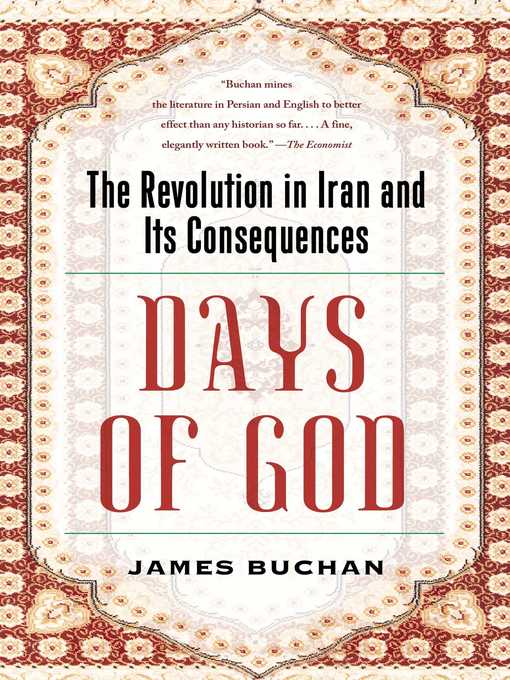
Days of God
The Revolution in Iran and Its Consequences
کتاب های مرتبط
- اطلاعات
- نقد و بررسی
- دیدگاه کاربران
نقد و بررسی

July 29, 2013
British novelist and journalist Buchan traveled to Iran as an undergraduate in the 1970s. Shocked by its dissipated modernity, he says, “I thought I had come too late to see what I had come to see, forgetting an ancient lesson: that in a year or two even this, also, would be obliterated.” His deep connection to the country serves him well in this sweeping panorama of the Shah’s Iran and its rejuvenation, occlusion, and disintegration under Khomeini. Buchan’s dry wit suffuses the poetic and philosophical—if not always straightforward—text; characters appear in major episodes before they have been properly introduced, events are mentioned in passing before they unfold. He devotes equal space to critical yet sympathetic portraits of the Rezas and to Khomeini. Of the first Pahlavi Shah, he says, “In introducing the notion of a powerful state, Reza was the most influential Iranian of the last century, more influential even than Ruhollah Khomeini.” The Ayatollah, pensive and closed to the world, drowned his religion and his country in a ruthless obscurantism: “It is said that once in Isfahan, the great Safavid divine Majlisi gave an apple to a Jew.... No such stories are told of Ruhollah Khomeini.” Agent: Joy Harris, Joy Harris Literary Agency.

October 1, 2013
British novelist and journalist Buchan (The Authentic Adam Smith, 2006, etc.) revisits the Iranian revolution for a clarification of the historical record. A plethora of recent works on Iraq and Afghanistan have given way to a deluge of interest in Iran and what makes this enigmatic empire tick. Buchan, a former foreign correspondent for the Financial Times, provides a helpful primer about the rise and fall of the Pahlavi state, fleshing out in particular the personalities of the autocratic father, Reza, a "former stable lad" who "crowned himself King of Kings" in 1926, and coddled son, Mohammed Reza, who rose to power in 1941 and was hounded into exile by the revolution in 1979. A country deeply embedded in ancient customs and privileges, Iran had known long-running dynasties of Safavids and Qajars, while the Pahlavis, in comparison, would be a flash in the pan, though they galvanized the country to hasty European-inspired modernity. A political lightweight on the world stage, Mohammed Reza was nonetheless tolerated by the British and Americans after World War II as offering "stability" to their oil interests in the region and left in power after the CIA-engineered coup of 1953. Meanwhile, the brilliant seminary student Ruhollah Khomeini swung into political action, challenging the shah's reforms and ending up in exile in 1963. The shah grew increasingly isolated from real events, spending lavishly on the buildup of his armed forces, and he was emboldened by the death of his chief rival, Egyptian president Gamal Abdel Nasser. Eventually, the revolutionary and religious elements could not be contained by the shah's forces, and Khomeini became the movement's spiritual leader. In sprightly prose, Buchan delineates the events that took on a mind of their own and left Iran doomed by its very "intransigence." A solid, accessible look at the making of modern Iran.
COPYRIGHT(2013) Kirkus Reviews, ALL RIGHTS RESERVED.

April 1, 2013
Buchan, who was studying in Iran at the time of the 1979 revolution, draws on Iranian records, memoirs, and newspaper reports to explain the revolution's causes and consequences. Expect vivid characterization from Buchan, an award-winning novelist as well as a journalist. With a 40,000-copy first printing.
Copyright 2013 Library Journal, LLC Used with permission.

Starred review from September 15, 2013
The recent history of Iran is a story dominated by stories of pillage by Western powers, swings toward military dictatorship, and promises unfulfilled. In this fascinating work reaching back to the close of the nineteenth century, Persian scholar Buchan has marshaled much of the available documentation and his own personal experiences in producing this definitive account of the long, revolutionary birth of the theocracy in Iran. Along the way, Buchan reveals an Iranian nation ever struggling toward modernity and torn by its past steeped in colonialism. The majority of the work follows the reign of Reza and Mohammad Reza of the Pahlavi dynasty, who attempted to drag Iran out of its medieval past on the fluctuating tide of oil prices only to be whisked aside upon the return of the exile Khomeini, in 1979. Buchan strikes a hopeful tone that if Iran can negotiate the nuclear crisis, it can enter the ranks of the advanced nations. Readers of Middle Eastern histories and diplomacy will find Buchan's skillful narrative both edifying and intellectually engaging.(Reprinted with permission of Booklist, copyright 2013, American Library Association.)

























دیدگاه کاربران